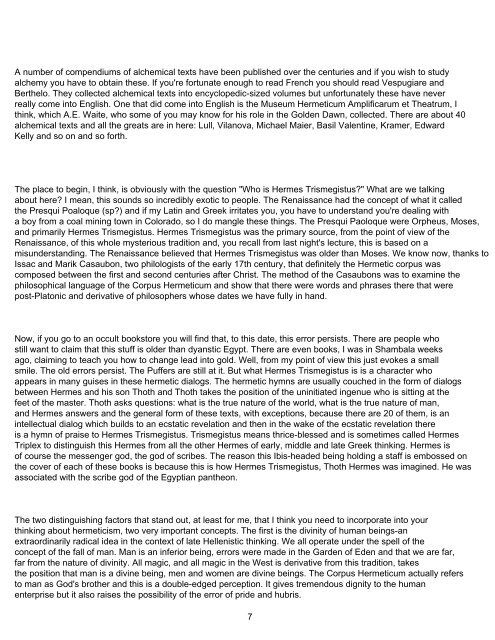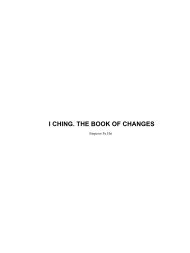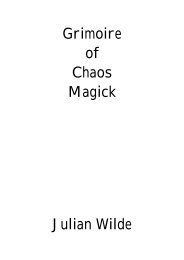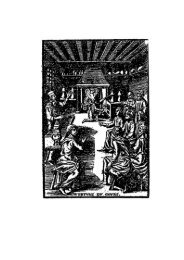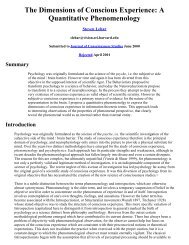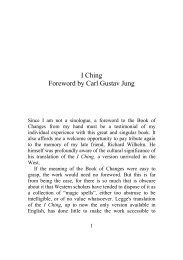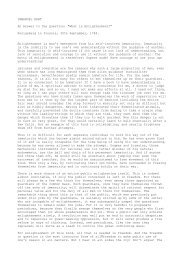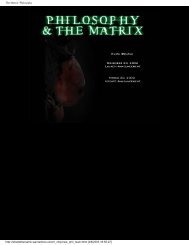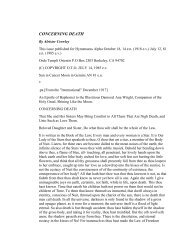Terence McKenna--Lectures on Alchemy - Shroomery
Terence McKenna--Lectures on Alchemy - Shroomery
Terence McKenna--Lectures on Alchemy - Shroomery
You also want an ePaper? Increase the reach of your titles
YUMPU automatically turns print PDFs into web optimized ePapers that Google loves.
A number of compendiums of alchemical texts have been published over the centuries and if you wish to studyalchemy you have to obtain these. If you're fortunate enough to read French you should read Vespugiare andBerthelo. They collected alchemical texts into encyclopedic-sized volumes but unfortunately these have neverreally come into English. One that did come into English is the Museum Hermeticum Amplificarum et Theatrum, Ithink, which A.E. Waite, who some of you may know for his role in the Golden Dawn, collected. There are about 40alchemical texts and all the greats are in here: Lull, Vilanova, Michael Maier, Basil Valentine, Kramer, EdwardKelly and so <strong>on</strong> and so forth.The place to begin, I think, is obviously with the questi<strong>on</strong> "Who is Hermes Trismegistus?" What are we talkingabout here? I mean, this sounds so incredibly exotic to people. The Renaissance had the c<strong>on</strong>cept of what it calledthe Presqui Poaloque (sp?) and if my Latin and Greek irritates you, you have to understand you're dealing witha boy from a coal mining town in Colorado, so I do mangle these things. The Presqui Paoloque were Orpheus, Moses,and primarily Hermes Trismegistus. Hermes Trismegistus was the primary source, from the point of view of theRenaissance, of this whole mysterious traditi<strong>on</strong> and, you recall from last night's lecture, this is based <strong>on</strong> amisunderstanding. The Renaissance believed that Hermes Trismegistus was older than Moses. We know now, thanks toIssac and Marik Casaub<strong>on</strong>, two philologists of the early 17th century, that definitely the Hermetic corpus wascomposed between the first and sec<strong>on</strong>d centuries after Christ. The method of the Casaub<strong>on</strong>s was to examine thephilosophical language of the Corpus Hermeticum and show that there were words and phrases there that werepost-Plat<strong>on</strong>ic and derivative of philosophers whose dates we have fully in hand.Now, if you go to an occult bookstore you will find that, to this date, this error persists. There are people whostill want to claim that this stuff is older than dyanstic Egypt. There are even books, I was in Shambala weeksago, claiming to teach you how to change lead into gold. Well, from my point of view this just evokes a smallsmile. The old errors persist. The Puffers are still at it. But what Hermes Trismegistus is is a character whoappears in many guises in these hermetic dialogs. The hermetic hymns are usually couched in the form of dialogsbetween Hermes and his s<strong>on</strong> Thoth and Thoth takes the positi<strong>on</strong> of the uninitiated ingenue who is sitting at thefeet of the master. Thoth asks questi<strong>on</strong>s: what is the true nature of the world, what is the true nature of man,and Hermes answers and the general form of these texts, with excepti<strong>on</strong>s, because there are 20 of them, is anintellectual dialog which builds to an ecstatic revelati<strong>on</strong> and then in the wake of the ecstatic revelati<strong>on</strong> thereis a hymn of praise to Hermes Trismegistus. Trismegistus means thrice-blessed and is sometimes called HermesTriplex to distinguish this Hermes from all the other Hermes of early, middle and late Greek thinking. Hermes isof course the messenger god, the god of scribes. The reas<strong>on</strong> this Ibis-headed being holding a staff is embossed <strong>on</strong>the cover of each of these books is because this is how Hermes Trismegistus, Thoth Hermes was imagined. He wasassociated with the scribe god of the Egyptian panthe<strong>on</strong>.The two distinguishing factors that stand out, at least for me, that I think you need to incorporate into yourthinking about hermeticism, two very important c<strong>on</strong>cepts. The first is the divinity of human beings-anextraordinarily radical idea in the c<strong>on</strong>text of late Hellenistic thinking. We all operate under the spell of thec<strong>on</strong>cept of the fall of man. Man is an inferior being, errors were made in the Garden of Eden and that we are far,far from the nature of divinity. All magic, and all magic in the West is derivative from this traditi<strong>on</strong>, takesthe positi<strong>on</strong> that man is a divine being, men and women are divine beings. The Corpus Hermeticum actually refersto man as God's brother and this is a double-edged percepti<strong>on</strong>. It gives tremendous dignity to the humanenterprise but it also raises the possibility of the error of pride and hubris.7


